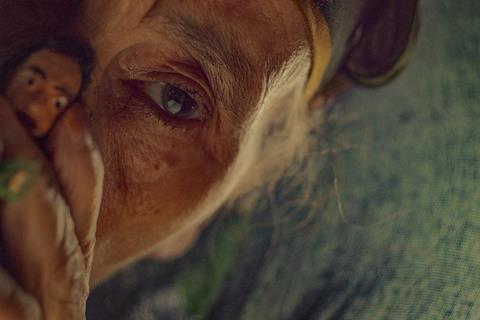Asmae El Moudir explores the history of both her family and her Casablanca neighbourhood in this distinctive documentary

Dir/scr: Asmae El Moudir. Morocco/Saudi Arabia/Qatar/Egypt. 2023. 97mins
On the night of Laylat-al-Qadr, during Ramadan, when the director Asmae el Moudir was 12 years old, she sneaked out of the family home in Casablanca. She carried a voluminous white dress borrowed from her sister, hidden in a carrier bag; on her forehead she had improvised an Indian-style bindi using toothpaste. Under cover of the religious festival, she visited the local photo studio to pose for a portrait – significantly, it was the first photograph taken of her in her life. The reasons behind the family’s lack of photographic records are explored in this intriguing, offbeat and personal documentary, which is part art installation – el Mouri and her father created a detailed miniature model of their former Casablance neighbourhood – part group therapy session and part history lesson.
Fresh, distinctive and very much its own entity
El Moudir’s first documentary The Postcard premiered at IDFA in 2020, and explored another aspect of her family’s history, taking as a jumping-off point a postcard of her mother’s childhood village. In the adventurous approach of her second film, and its willingness to challenge accepted family narratives, there’s a kinship with Sarah Polley’s Stories We Tell; elsewhere, the device of the roughly crafted model street scenes and domestic dioramas evoke other documentaries, such as Rithy Panh’s Everything Will Be OK and Alain Ughetto’s autobiographical animation, No Dogs Or Italians Allowed. But ultimately, the film is fresh, distinctive and very much its own entity, and as such it should enjoy a healthy festival run.
Using the model neighbourhood, El Moudir encourages her family to explore the geography of their memories and confront the questions that they had never previously been able to address. Foremost among thoese is why no photographs exist of El Moudir as a child. Confronted by her daughter, El Moudir’s mother unearthed a single group shot that showed the young Asmae in the background. Except, El Moudir was fairly certain that she was not the little girl in the picture. But why would her mother lie?
While both of El Moudir’s parents feature in this documentary, the dominating figure, looming large in both the film and in El Moudir’s memories of her childhood, is her formidable paternal grandmother, Zahra. It was tiny, furious Zahra who banned photographs from the family home, declaring them ‘haram’ or forbidden. Recreated in model form, Zahra stands like a sentry at the entrance to the house, surveying the street and brandishing her walking stick at all who displease her. In real life, Zahra uses an exaggerated mouth-zipping motion to quash any discussion of subjects of which she disapproves. But other family members and neighbours are ready to talk, finally tackling the subject of a national tragedy that unfolded these same Casablanca streets: the 1981 Bread Riots, an uprising that left some 600 people dead, their bodies interred by the authorities in a mass grave.
In her dual pursuit of the truth about her own family’s lack of pictures and the facts of the uprising, El Moudir seems to suggest that the two are linked in some way, which ultimately seems not to be the case. A tighter edit, and another pass on the narration that el Moudir delivers in a pleasingly melodic voice, might have clarified this more successfully.
Ultimately the film does, however, deliver a kind of closure for the director and her family; a sense that they might now be able to move forward. Zahra has so far refused to describe her granddaughter as a filmmaker, preferring to label her as a ‘journalist’. Filmmakers, she snaps, are never out of the bar; her granddaughter is shaming Zahra in front of the neighbours with her choice of career. On the strength of this provocative picture, Granny had better get used to the idea: El Moudir is most definitely a filmmaker, and a very promising one at that.
Production company: Insight films
International sales: Autlook Filmsales salma@autlookfilms.com
Producer: Asmae El Moudir
Cinematography: Hatem Nechi
Editing: Asmae El Moudir
Production design: Mohamed El Moudir
Music: Nass El Ghiwane

























No comments yet